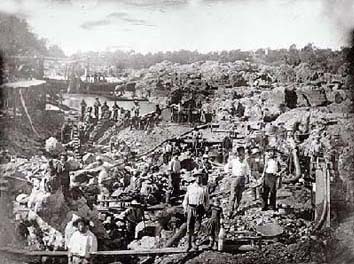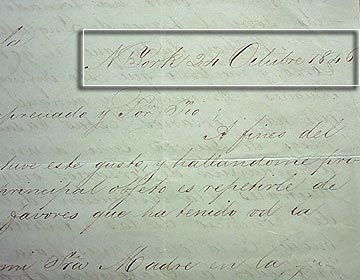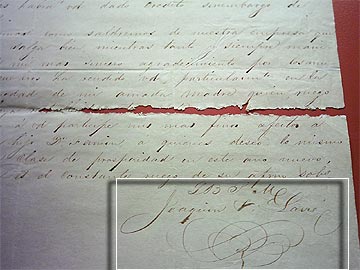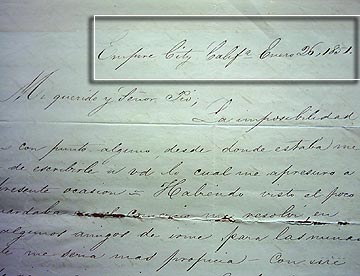
Gaiak
New York Uptown gangs, railroad tycoons and California gold miners. The basque hands that built America (1814-1851) (Second Part)
Traducción al español
When I told the story of Juan Bautista Lasala, that strange inmigrant who came to New York first as investor and then as a railroad tycoon, I compared the facts of his life with some literary and cinematographic fictions.
Joaquín Lavie, a nephew of Juan Bautista, and his adventures -no other name fits to those facts- were also good material for a novel or a Hollywood western. Letters by Joaquín Lavie sent from California to Madrid. Source,General Archive of Gipuzkoa, AGG-GAO DM 21, 7.
Indeed. He, as the characters created, and re-created, by Isabel Allende in "Hija de la Fortuna" went to California to find a best future denied not only in the old Europe but also in New York. Despite he owned and used one of the new revolvers -he and his companions called them "guns of six shots"- he was not a gunman, but as the sorried William Munny performed by Clint Eastwood in his wondrous movie "Unforgiven", he tried to get his fortune trading with goods in, as he used to say, the new El Dorado.
Nevertheless the story of Joaquín was the story of thousands in victorian Europe. He, as many other poor relatives of afluent families, relyed, entirely, on the deference and money of the richest members of the clan, who payed him his clothes, education and the rest of his maintenance.
Around the year 1846, as it seems, Joaquín rebelled against that system, sailed -or maybe "steamed"- from Europe and went to New York to get a new fortune of his own. His aim was make free eventually their mother and brethren chained with golden chains to the tutelage of Fermín Lasala y Urbieta. The brother of Juan Bautista, the strange tycoon arrived to Manhattan with enough capital to invest in the developement of those american railroads wich allowed the new country to become our present day economic -and military- superpower, still not completely exausted.
There he offered his services as a worker to this rich, powerful, uncle and started the same career of any other of those genuine "amerikanuak" described in the excellent work wrote both by William A. Douglass and Jon Bilbao about the basque inmigrants to south and north America.
It is difficult to trace what he did in New York. Undoubdtedly he was a man of fine intellect as we can learn reading, for example, the letter he sent to his uncle Fermín from New York the 24th october of the year 1846. There he analyzes, as keenly as any present day sociologist or historian, the war between Mexico and the United States, the cost of the conflict -more than the States could afford-, how the privateer war in the seas could affect the trade between America and Europe and also how the weeding of queen Elisabeth II of Spain could reactivate the defeated party of the carlist pretender. Letters by Joaquín Lavie sent from California to Madrid. Source,General Archive of Gipuzkoa, AGG-GAO DM 21, 7.
Nevertheless, despite his well proved intelligence, the records of the guipuzcoan archives reveal that Joaquín did not found his fortune in New York. Four years later he abandoned the city and went to San Francisco. A new letter, sent from that first emporium of California to Europe -carried by the steamer Panama- explained to Fermín Lasala y Urbieta the reasons for that dangerous, doubtful, journey. The young expected to found in these "golden lands" the necessary fortune to support decently his family. "Honour" and "virtue" would be the only limits to this purpose not satisfied in the steets of New York.
Joaquín was unlucky but not naive or starryeyed. The first thing he realized after his forty days journey, via Panama, was that he need lots of that money he lacked absolutely to exploit a gold mine. So he decided to establish himself as a merchant, triying to get his profit directly from the miners´ more or less basic needs. Again his keen eye discovered rapidly all the details related with trade in California. As he told to his uncle Fermín, that year of 1850 the value of a little hut was one thousand to one thousand and two hundred dollars. The lands needed to found the houses were also another source of money better than the best mine. Some of them has been sold in 30.000 dollars. And the superabundant saloons and gambling houses payed 100.000 to 120.000 dollars to the owners of their deeds. The flour, one of his uncle´s business, was losing ground. Months ago the prize of a cask was sixty dollars, but when he arrived to San Francisco was only 15. Anyway, as the prize of money was ten to twelve per cent by month, he expects to do some good business in that mad market.
Nevertheless something went wrong whith those plans. One year after, exactly the 26th january of 1851, Joaquín sent another letter to Madrid. This time he reported to his uncle Fermín from Empire City. The golden rush has attacked him. So, he and some companions took the way to Fresno armed with miner´s implements. There Fortune mocked again the new argonauts. First the indians robbed them some of their equipment. Then, when their camp was more or less firmly founded and some indians were persuaded to be their servants, one of the boys wounded himself when he was cleaning his revolver. Joaquín was sent to find a M.Dr. who lived 50 miles away from the camp. That was all the luck he get in that land of opportunities. As he told his uncle, four days after his departure to search the doctor and some mules the indians working in river Burns camps revolted, mainly instigated by those who had served Joaquín and his friends, and killed three american miners. Life and times of Joaquín Lavie. The California gold rush.
After that first slaughter the indians "have declared war to white men" and rallied the country ravaging. Even Joaquin´s new camp, near to river Burns, was rumoured as a target for the native americans´ rage. Fear, the one that obliged Joaquín and the rest of the company to abandon their tents some nights to avoid inminent attacks, was the only earning produced by the old gold river. That, and the continous killings and plunders perpetrated by indian bands from San Luis Obispo to San José and the restrictions laid upon the non-american miners, destroyed the hopes of Joaquín completely.
Another letter, sent from New York the 27th october of the year 1851, told about a sad defeat. Uncle Juan Bautista called Joaquín back to New York, sure as he was that the only thing he could find in the revolted lands of California would be a certain death. He has obeyed as a man without any other choice. The only thing he expected now was a decent job that he begged both to uncle Juan Bautista and uncle Fermín. Our man, owner of two hands that built America, was trapped again by the dark destiny of any poor relative in victorian Europe: his life was owned and managed by the richest members of the clan. That or burst. In Europe, in New York or under the shadow of indian tomahawks in the not so golden California. Link:
www.nyt.ulib.org Related articles Menu GAIAK Inicio > EM 252 > Gaiak -->
2004/04-30/05-07




